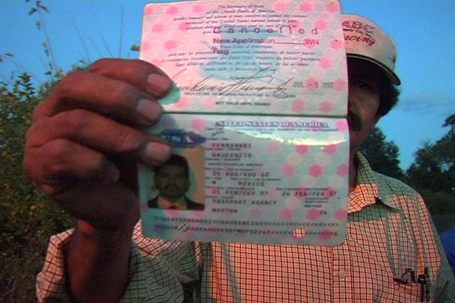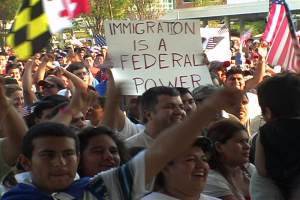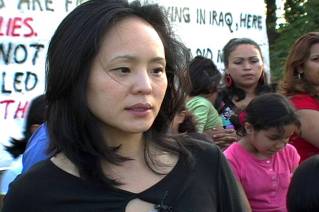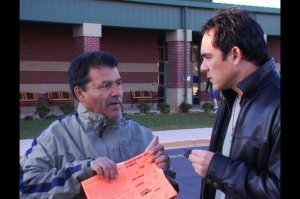Posts tagged ‘politics’
De Paisano A Paisano: An Interview with 9500 Liberty’s Eric Byler and Annabel Park
I had the chance last week to sit down with Eric Byler and Annabel Park, the directors of the new documentary 9500 Liberty that’s now playing across the country. 9500 Liberty outlines the 2007 battle in Prince William County, Virginia, over legislation that legalized racial profiling of “illegal immigrants” and the ways in which that battle polarized the tight-knit community.
I know Eric Byler as the director of Charlotte Sometimes and Tre, two seminal Asian American feature narratives dealing with angsty interpersonal relationships among several Asian Americans, but lately Eric’s been devoting his time and creativity to producing activist shorts. He and Annabel are the instigators of the youtube channel 9500 Liberty, of which the feature doc now in theaters is an offshoot. Both Eric and Annabel are articulate, committed, and smart as a whip, and they’re very passionate about changing the ways that political discourse is conducted in this country. Given the aggravating and idiotic screeds that pass for political expression these days it’s great to talk with thoughtful and creative people who are looking for alternative solutions to some of the tough issues facing the U.S. today.
Here are some excerpts from the almost-hourlong talk I had with them—the full interview can be heard below.
on the dangers of election season
Eric Byler: What we observed in Prince William County is that, in an election season, information is not as important as ammunition, and so people decide what they believe, say and repeat based on whether it helps their side win, not whether it’s true.
I think what certain insurgency tacticians have learned is that, because their positions are so radical and so far outside the mainstream, the only way they can assert their will is to use these tactics that alienate the average American from the political process and shrink participation down to a level that’s easier to manipulate.
So that’s what happened in Prince William County–they organized around deeply negative emotions. By combining racial antagonism with political partisanship they created an environment where only people who really thrive on conflict and who are comfortable with racial tension were going to those board meetings and were daring to speak on these issues.
I think that’s why Annabel and I were so concerned when we saw that become a national political strategy and instead of a blog amplifying the most negative emotions you find an entire news network to amplify not only the most negative emotions but those people they had assembled.
on button-pushing
EB: If you can make the election about some sort of social issue that really pushes emotional buttons–there are too many Mexicans in Arizona is basically the underlying theme of this election—that’s a really polarizing issue. Extreme candidates introduce extreme laws that get extreme reactions that create the kind of political landscape that favors the extreme candidate. So it’s not a surprise. And it always happens a certain number of months before the election because you’re lighting a fuse that’s gonna blow up.
on the use of intimidation tactics
EB: The week before the election (in Prince William County) was the scariest time for us. The racial tension in the county was more palpable than I ever expected to see in this century and I hope I never see again. People would drive by Liberty Wall and throw things at us—people would drive by and yell racial slurs. Those kind of climates are deliberately created for election season. Whether you’re a Democrat or a Republican you can respond really negatively to this kind of politics—we all can be intimidated, we all can be afraid.
on film and the internets as a means of empowerment
EB: Given that there are people who are going to use as a political strategy organizing around the most negative emotions known to humankind then what we have to do is to populate our democracy with people who are willing to be responsible and fact-based and solutions-oriented. That’s what the Coffee Party and 9500 Liberty both seek to do is enlist those people who might otherwise be intimidated into silence because of these kinds of tactics and show them two examples of people who are prepared to engage even in a political process that’s been mightily toxified and frightfully polarized, because we have that much at stake, and to convince them that they have something at stake.
on hearing the news of the anti-immigrant laws in Arizona
Annabel Park: I got really emotional—I started crying! It was almost like a flashback to northern Virginia 2007. It was traumatic!
EB: It’s just such an unnecessary tragedy—the economic hardship that this kind of policy caused, the social toxification, the damage to public safety, was all so unnecessary, and really the only ones who benefit are very extreme politicians who cater to a really tiny fraction of out population.
on creating a more civil political discourse
AP: Politics is about us making collective decisions, and democracy is a method for making collective decisions–it’s not meant to be a fight with two sides. It’s supposed to be a situation where we thrive on differences and diversity but we need to be able to talk to one another. We have to create opportunities for people to talk to one another. That’s the first step in a democracy, that open dialogue—it has to be civil, there has to be real information exchanged. In a way it’s a very simple thing—asking people to protect and practice democracy, and by using social media, to create not only a communication network but by having this idea go viral—let’s go viral with this idea that we have to participate in democracy, and to give them portals for doing it.
on making a difference
AP: The (9500 Liberty) youtube channel did have impact on the community. We just showed (the movie) in Phoenix and in parts of Arizona and I think we made some progress there. I think there are people who are now ready to have dialogue at least. Just saying “Illegal Is Illegal” is just not really a starting point for dialog. It doesn’t help us formulate policy, it’s just grandstanding—it shuts down conversation.
on optimism and inevitability
EB: I feel very optimistic. 9500 Liberty is a microcosm of what’s happening in Arizona and Arizona is a microcosm of what’s happening across the country. The reason why we’re seeing these insurgency tactics, these desperation tactics coming from the right is that they’re afraid of the changes that really are inevitable. They feel that they’re actually delaying those changes by using these extreme tactics but I believe they’re actually accelerating these changes.
Every year another crop of kids turn 18 and registers to vote and during that same time unfortunately we have to say goodbye to our grandparents and aunts and uncles who grew up during the pre-civil rights era and who aren’t really as comfortable with the 21st century as those of us who are younger. So these kinds of cultural issues where a group of very extreme politicians are asking us to hate another group more than they love our country, are gonna cease to be effective, and that’s really when this will stop, when it can be shown, and maybe it will be in November, that this kind of fear politics is not effective.
on the relationship between love stories and political activism
EB: Both Tre and Charlotte Sometimes are essentially love stories where I made the choice to cast both mixed race and full-blooded Asian Americans. And I didn’t realize it but, because it’s an identity issue and identity is very much something that informs my artistic choices, for me it became a political choice. As Annabel likes to say, politics and identity are essentially the same thing.
Eventually I had to become comfortable talking about politics because I was talking about race and identity, and so the transition isn’t as unexpected or as dramatic as you might expect. Identity issues are at the core of American politics right now.
The short answer is I think I decided that in this era of American history, when so many important decisions are being made that are going to affect the rest of this century, that just making love stories, albeit love stories that do have social and political commentary, was not enough of a contribution—I wanted to do more.
(Now) I feel like I could make a movie about Weimar Germany. I could do one of those futuristic movies about a war. I now know what it feels like when you have politicians laying the groundwork for war and you have agitators essentially systematically dehumanizing a population so they can directly take action against them
on “looking illegal”
EB: I think that in some ways Asian Americans were given a pass on this issue in a weird way, even though many Asian Americans are undocumented—it’s a culture war directed at Latinos, let’s face it. And so I’m the one that actually looks Latino (laughs), being the halfer–
During that time, everything was about looking around and trying to figure out who looks illegal–the police are now being directed to try to tell who looks illegal, the government is basing policy on who looks illegal and who citizens say are illegal, because they went to the emergency room and saw a lot of Latinos—so they must’ve been illegal! So everything’s about who looks illegal– And y’know, some days I wake up I look more “ethnic” and my hair’s messy or curly or something. When you live in a climate like that you wake up in the morning and you see yourself in the mirror and you say, “Oh my god—I look illegal today!”
on the role of film and participation politics
AP: Being filmmakers doesn’t give us a special status not any more than being elected gives us a special status. We all have to be part of this democratic process or it’s just gonna fail. To me that one thing that’s a given—if people don’t participate it’s not a democracy.
There are enough people who have been silent who now have an opportunity to say, “Y’know what, I don’t want to be silent any more, I’m sick of this, enough is enough, let’s come together as a community, let’s stop being Democrats and Republicans and start being Americans and figure out what we have in common and have some of these tough conversations about our future. How much money are we spending on the military? How long can we sustain these two wars? What does it mean to be an American at this point? What unites us as a people in a meaningful way beyond the fact that we live in the same land mass?
on the dire need for civility and the role of the Coffee Party
AP: We’ve got to leave our ideology aside in order to come together. Otherwise you’re submitting to these forces that are in every society that want divide people and separate and secede and balkanize—that’s always there. If we don’t step up and counter that with the force of unity and peace and harmony then we’re headed for a very, very bleak future.
With the rise of the Tea Party there was this narrative that the Tea Party represented America, and there’s a lot of frustration with the government, but their point of view is not representative of America. To me it’s a marginalized view of minorities who know how to engage in political theater.
What happened with the Coffee Party is that I started this fanpage on facebook that just exploded. We want to find another way of engaging. We have these problems but I don’t want to be out there denouncing the government or Obama.
I want to be out there trying to figure out how to improve the government and to feel like we’re on the right path so that ordinary people are being represented and we’re on the path to not destroy one another but to work together.
So people are sort of just self-organizing—we have local chapters across the country. In the Bay Area there’s a cluster of them that are very active—in LA, too. There are local chapters–they function largely autonomously. We have national campaigns—like we’re having one right now where we ask people to discuss campaign finance and corporate personhood.
We’re trying to give people ways of connecting to the political process that isn’t alienating, isn’t negative, it isn’t about fighting people but it’s about dialogue and bringing people together–and really insisting on civility.
I don’t know how true this is but I’ve heard people say that people in the Tea Party, it’s had an impact on them. They’ve been much more conscious of their tactics and whether or not they’re going to be judged as being uncivil or not. I think I just like having civility become a viral idea.
Are we gonna being screaming at our politicians and at each other, or are we gonna say, “Okay, we need reform–how do we get there? Let’s work together.”
9500 Liberty (81 minutes)
Co-Directed by Eric Byler and Annabel Park
UPDATE: 9500 Liberty will have its cable television premiere this month on MTV Networks. It will show on Sunday, September 26th at 8pm (ET/PT) on MTV2, mtvU (MTV’s 24-hour college network), and Tr3s: MTV, Música y Más (formerly MTV Tr3s) as part of Hispanic Heritage Month. You go, Eric & Annabel!
Here’s the extended trailer for the film:
Here’s the full interview (trt: 52 min.)
Know Your Enemy: Factsheet at International Hotel Manilatown Center
Just peeped an excellent show at the Manilatown Heritage Foundation’s gallery at the International Hotel. Entitled Factsheet: Activism Is Not A Crime, the exhibit includes thirty posters decrying human rights abuses in the Philippines.
The posters were created by artists both in the Philippines and the U.S. and represent a broad range of styles and approaches. Epjay’s Silencio uses straight-up graphics and text in the tradition of the best agit-prop one-sheets. England Hidalgo’s Cleansing takes after punk’s DIY aesthetic, combining line drawing, painting, photocopying, and collage. By hanging them side-by-side the exhibit presents two very different but equally effective visions of what a political poster can be.
The show is chock-full of these types of juxtapositions, and is a testament to the talent and vision of the artists included. Factsheet is an excellent example of the many ways that artists can conceptualize and produce forceful pieces of political art.
Each poster in the show has a small factsheet that concisely identifies the title, artist, and incident that inspired it. Together with the expressionistic artwork they accompany, these simply worded placards are explosive examples of the power of words and images to define and illuminate injustices.
For instance, J. Pacena’s 136th Noli Capulong , states “Noli Capulong, Deputy Secretary-General of Bayan Muna’s Southern Tagalog chapter assassinated Calamba, 2006.” The poster it accompanies is a simple image of a bound man in a Jeep, his body pierced in four places by a sinuous orange line. The title refers to Capulong’s status as the 136th victim of state-sponsored assassination in the Southern Tagalog region—a human-rights activist, he was shot four times while driving his Jeep after meeting with tenants who were fighting eviction.
Through their work the artists in the show are bringing to light and surfacing the wrongdoings of the government, police, church, and military in the Philippines. They’re using their skill and vision to continue pressuring President Gloria Arroyo to correct these abuses and to bring those responsible to justice. Which is pretty cool if you think about it, and a nice way to make significant and meaningful work in an artworld that is all too often narcissistic and irrelevant.
Factsheet: Activism Is Not A Crime
Through April 24, 2010
Closing reception, Sat. April 24, 4-6p
International Hotel Manilatown Center
868 Kearny Street @ Jackson Street
San Francisco CA 94108 | 415-777-1130 Office | 415-399-9580 Gallery
Gallery hours: 1PM – 6PM, Tuesday – Saturday
Admission: Free
UPDATE: from one of the organizers of the show. Closing reception Saturday, April 24th, from 4:00 – 6:00 PM, featuring live performance by Diskarte Namin and food for sale by Coco Lim (partial proceeds benefiting Manilatown Heritage Foundation). Be there!
UPDATE 2: Factsheet has moved across the Bay to Oakland for a run.
Factsheet: Activism is NOT a Crime
May thru June 2010
Asian Resource Gallery
310 Eighth Street, Oakland Chinatown
Open Monday thru Friday, 9am to 6pm
Artists/ curators Lian Ladia and Con Cabrera from Filipino cultural activist collectives in the U.S. (Kwatro Kantos) and the Philippines (ARREST) initiated this project, which is traveling to different cities across the globe.
RECEPTION: Thursday, May 27th, 6 pm • FREE to the public
Featuring speakers from the recent People’s International Observers Mission and performances by Yaminah Lunar, The Kasamas, and AYPAL dance crew.
For more information, contact:
Greg Jung Morozumi c/o Asian Resource Gallery, 510/532-9692
FACTSHEET is co-sponsored by Committee for Human Rights in the Philippines(SF), Anakbayan (East Bay), BAYAN USA, & Filipino Advocates for Justice
San Francisco politics: The inauguration of Eric Mar

Jade and Eric Mar on the campaign trail, 2008
Just went to Eric Mar’s inauguration to the San Francisco Board of Supervisor’s down at City hall today. I’ve known Eric, his wife Sandy & Eric’s twin brother Gordon since we were all undergrads back at the dawn of time, so it was really great to see him sworn in today. I’m a sucker for speeches that thank family members and I was especially choked up when Eric mentioned his late father, who died four years ago right around the time my own dad passed. Eric’s daughter Jade is just three months older than my older daughter so seeing Jade out of school and all decked out in her party duds to see her dad sworn in was also a kick for me.
Eric’s been a long-time activist and organizer in the Asian American community and he’s been a tireless advocate for the disenfranchised since our college days long ago. He’s been on the San Francisco School Board for the past eight years and this past November survived a bruising campaign to represent San Francisco’s 1st District, which comprises the inner Richmond. He and fellow progressive David Chiu were targeted by San Francisco’s downtown business establishment and were both subjected to smear campaigns that impugned their character, their patriotism and their personal lives. Today both were sworn in as Supervisors (Chiu from the Chinatown/North Beach district) in large part due to a huge grassroots support from their neighborhoods. Together with incumbent Carmen Chu this marks the first time that three Chinese Americans have simultaneously been on the Board of Supervisors in San Francisco history.
As icing on the cake, David Chiu was also elected President of the board today. The process of his election was an interesting example of SF politicking—it took eight ballots to break the deadlock between Sup. Sophie Maxwell, who was supported by allies of Mayor Gavin Newsom, and the progressive candidate, who was at first David Avalos, then David Chiu. Eric Mar played a key part in brokering the deal that sent Chiu to the President’s seat. With Maxwell and Avalos in a near deadlock, with neither able to gain a majority for for several rounds, Eric switched his vote from Avalos to Chiu. He followed up his vote-switch with a cogent and articulate plea for supporting Chui as a President not only for Chinese Americans but for all San Franciscans. Veteran progressives Ross Mirkarimi and Chris Daly, who had withheld their support for Avalos, then switched their votes to Chiu, giving him the majority and electing him Board President. It was a subtle and interesting moment of political intrigue, clearly delineating the lines between various factions on the Board. It also indicated the political modus operandi of various Board members, as well as their possible future alliances. Mirkarimi and Daly clearly enjoy the bold power play—Eric Mar’s style is much more subtle and close to the vest. The five supervisors who supported Sophie Maxwell are an obvious voting bloc allied with Mayor Newsom—the remaining six supes are more loosely allied, with sub-alliances within the larger group. Interestingly enough, Daly did not support his former aide John Avalos in his bid for Board president but eventually threw his weight behind Chiu. Time will tell if the lines of allegiance will become more clearly drawn in the future, or if Board alliances continue to fluctuate throughout the next term.
UPDATE: here’s more information via my friend and colleague Malcom Collier.
Hello Valerie
Nice blog but not quite accurate – my fault maybe as I had a mental block when you were talking to me at city hall. In late 1990s we had three Chinese Americans on the Board – Leland Yee, Mabel Teng, and Michael Yaki. Yaki is 1/2 Chinese American, 2/8 Japanese American, and 1/8 Hawaiian Native. So unless you want to leave out the mixed folks, today is not the first time with three CAs on Board.
In case you are interested, I looked up the terms:
Mabel Teng, 1995-2001 – she was the first Asian American, not just the first AA woman, to win a city wide election to the board without being appointed to the position first. All previous persons won after being appointed first and running as incumbants.
Leland Yee, 1996-2001
Michael Yaki, 1997-2002
George Chinn (I think that is the spelling) was the first Chinese American to serve on the Board, appointed 1973. Gordon J. Lau appointed to the board 1977 and later elected, but not city wide – there were district elections then. Tom Hsieh Sr. won citywide after being appointed to a vacancy in 1986, then won elections in 1988 and 1992.
UPDATE 2: My buddy Danny Plotnick has another take on the board president election which takes the pols to task for their flagrant manipulation of the system. Change we can believe in or more of the same?
UPDATE 3: The effervescent sociologist, scholar and person-about-town Grace Yoo takes another look at the event, and the post-party spreads, on her brand-new blog.








Recent Comments